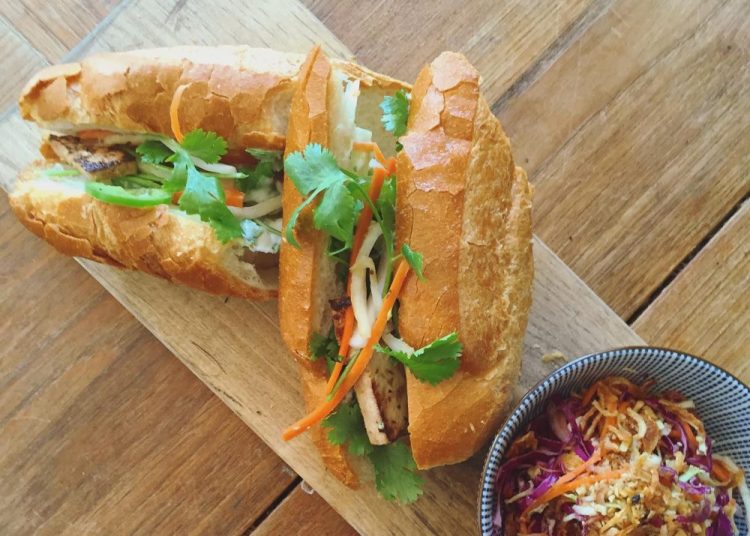The typical banh mi is made by stuffing cold cuts, pâtés and pork products into a fluffy French roll with fresh herbs and pickled vegetables. But lately a lesser-known, vegetarian version of the classic Vietnamese sandwich has found its way onto at least four menus in and near Portland.
The sandwich has shown up at Honey Paw, Green Elephant, South Portland convenience store and Asian sandwich shop Le Variety, and the Portland Food Co-op, where you can find it in the prepared foods cooler.
The sandwich is a legacy of French colonialism in modern day Vietnam, marrying French-influenced baguettes and mayonnaise with Vietnamese-influenced pickled carrots and cilantro and mint. The tofu version is associated with the vegetarian traditions of Buddhist temple cuisine.
In fact, Quang Nguyen, one of the owners of Le Variety and a Buddhist himself, said the store in South Portland’s Redbank neighborhood does attract customers from the Vietnamese Buddhist temple in South Portland.
More noticeable, though, have been the customers from surrounding towns seeking out the off-the-beaten-path shop to try the tofu sandwich after the store promoted photos of it on Facebook.
“It’s a great healthy option for people and very affordable,” Nguyen said. “We want to create more options for the vegetarian community, keep the costs down, and make it quick and filling.”
The Le Variety tofu banh mi is a bargain at $4.85, while the others range in price from $9 to $12. Nguyen said the tofu banh mi is the store’s top seller alongside the beef banh mi.
The plant-based banh mi sandwiches in the Portland area share similar flavors, but have a number of differences, too: The tofu is generally fried, with the Green Elephant and the Honey Paw using Maine-made, organic Heiwa tofu. Both the Green Elephant and Le Variety season the tofu in a lemongrass marinade. The Honey Paw dunks it in tempura batter before frying and the bread is made in-house.
The sandwiches at Le Variety and Green Elephant feature house-pickled carrots (and daikon at Green Elephant). Le Variety and the Honey Paw make their own mayonnaise, with eggs, but the sandwiches can be ordered without the mayo. The Green Elephant uses vegan mayonnaise, while the Portland Food Co-op banh mi has no mayonnaise.
That is just one of the ways that the co-op’s banh mi is the least traditional of the four. In place of tofu, the co-op uses Maine-made, organic Lalibela tempeh marinated in Korean barbecue sauce and pan-seared. The carrots aren’t pickled. The sandwich is presented in a whole wheat wrap and comes with a container of red pepper vinaigrette dressing.
The co-op’s banh mi now competes with the falafel sandwich – also vegan – as the grocery store’s top seller. Steve Quattrucci, the co-op’s deli manager, speculated that the meat-free sandwich’s sudden rise in local popularity is because a vegetarian banh mi appeals to non-vegetarians.
“It’s one of those sandwiches that you don’t need the meat,” he said. “People feel satisfied by it. That’s the key to getting crossover sales that appeal to more than just vegans. We find lots of meat eaters who are eating meat less and looking for healthier options.”
The Green Elephant has seen steady sales of its banh mi, said front-of-house manager Andy Cole. He attributed the appearance of vegetarian banh mi on local menus to the closing last year of Kim’s Sandwich Shop on St. John Street, which for years had offered an inexpensive tofu banh mi. Local grocers and restaurants, he said, are responding to the market void.
Brewster Taylor, chef de cuisine at the Honey Paw, said the restaurant’s tofu banh mi “sells pretty well” and also noted its crossover appeal. The banh mi is gaining fans among foodies, he said, because it’s “just a delicious sandwich.”
Author, blogger and Instagram star Andrea Duclos agrees. She lives in West Palm Beach, Florida, and included a recipe for a tofu banh mi (see recipe) in her 2015 vegan family cookbook “The Plantiful Table.”
The lifestyle blogger said the tofu banh mi is increasingly popular nationwide, in part as an extension of what she calls “bread culture.” Bread culture, she explained, includes everything from artisan bread to restaurants that serve only toast to more sandwiches on all menus.
“Hip sandwiches are just the thing now,” she said. “With the banh mi, you don’t have to be a vegan restaurant to have the sandwich. Bread culture is back and the tofu banh mi is hip, easy, and cool.”
Avery Yale Kamila is a food writer who lives in Portland. She can be reached at:
Twitter: AveryYaleKamila
avery.kamila@gmail.com
Send questions/comments to the editors.


